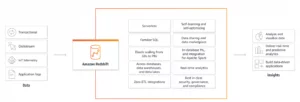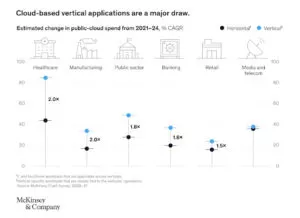In the swiftly evolving digital landscape, ecommerce has become an intrinsic part of our lives. As many businesses shift their operations online, the demand for scalable and secure infrastructure has increased significantly. This is how cloud computing for ecommerce comes into play, offering a smart solution that enhances the performance and security of ecommerce platforms. In this blog post, we will put light on how cloud computing for ecommerce industry has remodeled and why businesses should embrace this technology to stay competitive.
-
Scalability: Handling High Traffic
One of the major advantages of cloud computing for e-commerce is its scalability. During peak shopping seasons or flash sales, e-commerce websites experience a massive surge in traffic, which can potentially lead to performance issues and downtime if not managed effectively. Many cloud platforms, like Amazon Web Services (AWS) and Microsoft Azure, offer elastic computing resources that can naturally scale up or down depending on demand.
According to an AWS case study, the popular e-commerce platform Zalando experienced a 10-fold increase in traffic during peak shopping events. By leveraging AWS’s scalable infrastructure, Zalando was able to handle the increased traffic without any performance degradation or downtime. This demonstrates the ability of cloud computing to dynamically scale resources to match the demand, ensuring a seamless shopping experience for customers.

-
Improved Performance and Speed
In the highly competitive e-commerce landscape, speed is crucial. Customers expect fast page load times and smooth navigation throughout the shopping experience. Cloud computing provides e-commerce platforms with the infrastructure needed to deliver superior performance. By leveraging content delivery networks (CDNs) and caching mechanisms, cloud-based e-commerce applications can reduce latency and provide faster access to product catalogs, images, and other resources.
A study by Akamai found that 53% of mobile users will switch to another website if at all it takes longer than three seconds to load. Cloud providers like AWS and Cloudflare offer CDN services that distribute website content across multiple servers worldwide, reducing the distance between the user and the content. This optimization leads to faster page load times and a better user experience.
-
Enhanced Security and Data Protection
Security is a top concern for e-commerce businesses dealing with sensitive customer information and financial transactions. Cloud computing offers robust security measures to safeguard e-commerce platforms from cyber threats and data breaches. Cloud providers implement advanced security protocols, encryption techniques, and regular security audits to protect data at rest and in transit.
For example, AWS provides a wide range of security services, such as AWS Identity and Access Management (IAM) for user authentication and authorization, AWS Web Application Firewall (WAF) for protecting against web-based attacks, and AWS Shield for DDoS (Distributed Denial of Service) protection. These security services help e-commerce businesses fortify their applications and infrastructure against potential threats.

-
Disaster Recovery and Business Continuity
For e-commerce businesses, downtime can have severe financial implications. Cloud computing enables seamless disaster recovery and ensures business continuity in the face of unexpected events. Cloud platforms offer automated backup solutions and redundant storage options, ensuring that data remains safe and accessible even in the event of hardware failures or natural disasters.
AWS offers services like Amazon S3 (Simple Storage Service) for durable and scalable object storage, which automatically replicates data across multiple data centers. Additionally, services like AWS Backup provide centralized backup management, enabling businesses to automate and streamline their data backup processes. With these cloud-based disaster recovery solutions, e-commerce businesses can minimize downtime, quickly restore services, and maintain customer trust.
-
Cost Efficiency and Flexibility
Traditional on-premises infrastructure can be expensive to set up and maintain. Cloud computing offers cost efficiency and flexibility for e-commerce businesses. Cloud services operate on a pay-as-you-go model, allowing businesses to scale resources up or down based on demand. This eliminates the need for large upfront investments and enables cost optimization by only paying for the resources used.
According to a study by McKinsey, businesses that migrate to the cloud can achieve cost savings of up to 30% on factory costs. By leveraging cloud platforms, e-commerce businesses can avoid the expenses associated with purchasing and maintaining physical servers, networking equipment, and cooling systems. Cloud providers offer a profitable range of pricing options, including on-demand instances, reserved instances, and spot instances, giving businesses the flexibility to choose the most cost-effective option for their specific needs.
Furthermore, cloud platforms provide an incredible range of services and tools that e-commerce businesses can leverage without the need for significant additional investments. For example, AWS offers services like Amazon RDS (Relational Database Service) and Amazon Redshift for database management, Amazon S3 (Simple Storage Service) for cost-effective and scalable object storage, and Amazon Elastic MapReduce (EMR) for big data processing. These services enable businesses to access enterprise-grade infrastructure and services at a fraction of the cost compared to building and managing them in-house.

-
Improved Customer Experience
In the highly competitive e-commerce landscape, providing an exceptional customer experience is paramount. Cloud computing plays a pivotal role in enhancing the overall customer journey. With the facility to scale resources based on demand, e-commerce platforms powered by the cloud can handle increased traffic, ensuring fast and responsive website performance.
According to a study by Akamai, a leading content delivery network (CDN) provider, a one-second delay in a website’s load time can result in a 7% reduction in conversions. Many big giants in cloud computing, like Amazon Web Services (AWS) and Google Cloud Platform (GCP), offer elastic scaling capabilities that allow e-commerce businesses to meet peak demand without compromising performance.
Additionally, cloud-based applications can leverage advanced analytics and machine learning capabilities to personalize the shopping experience, offering recommendations, personalized marketing campaigns, and targeted promotions based on customer preferences and behavior. By analyzing customer data in real-time, e-commerce businesses can tailor their offerings and improve customer satisfaction.
According to a study by Accenture, 75% of buyers are more likely to make a purchase from a retailer that identifies them by name, suggests options based on past purchases, or has a purchase history.
-
Global Reach and Expansion Opportunities
Cloud computing enables e-commerce businesses to expand their reach beyond geographical boundaries. Cloud platforms have data centers stretched across various regions globally, permitting businesses to deploy their applications closer to their target markets. This proximity considerably lessens latency and ensures a smoother shopping experience for customers located in different parts of the world. For example, AWS has a global infrastructure presence with data centers in multiple regions, including North America, Europe, Asia-Pacific, and South America. GCP also offers a global network of data centers to support e-commerce businesses’ global expansion plans.
Furthermore, cloud platforms offer seamless scalability, allowing e-commerce businesses to quickly enter new markets and accommodate increasing customer demands without investing in local infrastructure. According to a survey conducted by McKinsey, a retailer can increase its international revenues by more than 30 percent year on year. By leveraging the cloud, e-commerce businesses can take advantage of global opportunities, tap into new customer bases, and grow their business more efficiently.

-
Streamlined Collaboration and Integration
Cloud computing facilitates streamlined collaboration and integration within the e-commerce ecosystem. With some credible cloud-based tools and platforms, businesses can seamlessly integrate their e-commerce systems with other essential components such as inventory management, order processing, payment gateways, and customer relationship management (CRM) systems. This seamless integration ensures real-time data synchronization and eliminates manual processes, reducing errors and enhancing operational efficiency.
For example, Salesforce Commerce Cloud, a cloud-based e-commerce platform, integrates with popular CRM systems like Salesforce Sales Cloud, allowing businesses to gain a holistic view of their buyers and provide personalized experiences. Similarly, platforms like Shopify and WooCommerce offer integrations with various payment gateways, simplifying the payment process for e-commerce businesses.
By leveraging cloud-based collaboration tools, teams can work collaboratively, accessing and sharing data and resources from anywhere, at any time, fostering better communication and productivity. Platforms such as Microsoft 365 and Google Workspace provide cloud-based productivity and collaboration tools that enhance teamwork and facilitate seamless collaboration.
-
Sustainability and Green Initiatives
Cloud computing contributes to sustainability efforts and green initiatives in the e-commerce industry. Traditional on-premises infrastructure requires significant energy consumption and physical space for servers and cooling systems. By migrating to the cloud, e-commerce businesses can reduce their carbon footprint by leveraging shared data centers that are optimized for energy efficiency. Cloud providers are committed to implementing green practices, such as using renewable energy sources and optimizing server utilization, further reducing environmental impact.

For instance, AWS has promised to achieve 100% renewable energy adoption for its global infrastructure footprint. As of 2021, 13 regions of AWS were powered by 95% renewable energy. GCP also emphasizes sustainability, with a goal to drive its data centers on 100% renewable energy and achieve carbon neutrality. According to a report by Greenpeace, major cloud providers, including AWS, GCP, and Microsoft Azure, are leading the industry in renewable energy adoption, accounting for the largest share of corporate renewable energy deals globally. The shift to the cloud has notable environmental benefits.
Forbes stated that a study conducted by the Lawrence Berkeley National Laboratory makes organizations reduce energy consumption by up to 84% for a typical e-commerce workload by simply moving to the cloud. Additionally, the study highlighted that cloud-based e-commerce platforms could reduce carbon emissions by up to 88%. These significant reductions in energy consumption and carbon emissions make cloud computing a sustainable choice for e-commerce businesses aiming to minimize their environmental impact.
-
Future-Proofing Ecommerce Infrastructure
As technology advances and customer expectations evolve, e-commerce businesses need to future-proof their infrastructure. Cloud computing provides the scalability, agility, and innovation required to adapt to changing market dynamics. Cloud platforms continuously evolve and introduce new services and features that can be seamlessly integrated into existing e-commerce systems.
AWS, GCP, and Microsoft Azure, among other cloud providers, offer a wide range of cloud-native technologies to future-proof e-commerce infrastructure. Serverless computing allows businesses to focus on building applications without worrying about server management, enabling faster time to market and cost optimization. Containerization technologies like Docker and Kubernetes provide scalability, portability, and efficient resource utilization for e-commerce applications. Microservices architecture allows businesses to break down their applications into smaller, independent services, promoting flexibility, maintainability, and scalability.
By leveraging these cloud-native technologies, e-commerce businesses can build a flexible and future-ready infrastructure that can quickly adapt to emerging trends and technologies.
According to a report by Gartner, by 2025, over 95% of digital workloads will be deployed on cloud platforms. Embracing cloud computing not only ensures compatibility with future innovations but also provides access to a vast ecosystem of tools and services that can enhance ecommerce operations and drive growth.
Conclusion
Cloud computing has become an indispensable component of the ecommerce industry, offering a plethora of benefits ranging from scalability and performance to security and cost efficiency. By leveraging the capabilities of cloud platforms such as AWS, GCP, and Microsoft Azure, e-commerce businesses can optimize their operations, deliver exceptional customer experiences, and obtain a competitive edge in the digital marketplace.
As the ecommerce landscape continues to evolve, embracing cloud computing is not only a strategic decision but also a necessity for businesses looking to thrive in the ever-changing digital world. By harnessing the potential of the cloud, businesses can unlock new opportunities, enhance performance, strengthen security, ensure sustainability, and future-proof their e-commerce infrastructure.
Nestify offers services to major cloud providers such as AWS, DigitalOcean, Vultr Bare Metal, Google Cloud Platform, and UpCloud. Now is the time to take advantage of this service of Nestify for a seamless hosting experience!



